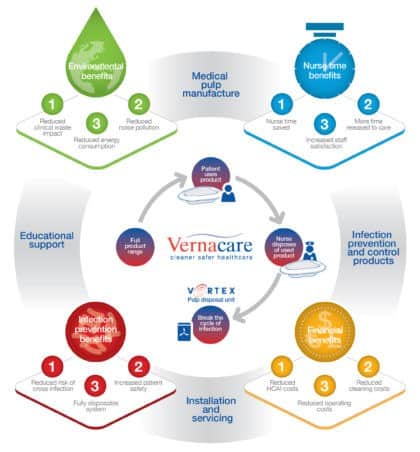Providing alternative to re-usable systems: Vernacare
Vernacare plays a leading role in preventing cross contamination and infection in hospitals around the world, says Marketing Director Emma Sheldon.

Given the global focus on targeting anti-microbial resistance, hospitals worldwide are sourcing products that help them reduce or eliminate cross infection. UK manufacturing company Vernacare has created a successful system that is used in 96% of NHS hospitals in the UK and being considered for both new-build hospitals and existing healthcare facilities across the world.
Based in Greater Manchester and focused on selling products into healthcare facilities around the world, Vernacare is the only company to manufacture this complete single use human waste disposal system, including the Vortex disposal unit and full range of medical single use products.

“Vernacare offers an alternative to re-usable systems where plastic or stainless steel bedpans are re-used and washed, either by hand, or in bedpan washers. Our system, being single use, means that patients use their fibre-moulded container once, and it is safely and easily disposed of in our environmentally-friendly Vortex machines,” says Marketing Director Emma Sheldon. “This means that the risk of cross-contamination is eliminated, as there is no risk that products which have not been adequately decontaminated remain in circulation and used between patients.
“The system was originally invented to save time and increase productivity. The original idea was created within our NHS customers, who identified a need to reduce the time it took to reprocess used badpans and other containers. Vernacare came up with a solution which plays a part in infection prevention, sustainability and cost -saving for healthcare facilities. The system helps reduce the number of steps and the time involved in dealing with this important and critical area, to help minimise risk.”
Employing 180 people around the world and producing 150 million fibre-moulded products each year, Vernacare has attended trade missions, round table meetings and international events alongside Healthcare UK. “We engage with Healthcare UK, UKTI, UK India Business Council and CBBC to help us to understand where opportunities exist globally and how to access them. We have worked closely with these agencies to better understand the markets we enter, and to develop our networks,” says Emma.
“We successfully sell our products to many markets across the globe, with particular success in Canada, Australia and New Zealand, Italy, Spain and the Middle East. UKTI has been a fantastic partner in helping us to research and enter new markets – particularly Asia Pacific. With its help from a zero starting point in 2012, we now have a high share of the hospital market and sales to Singapore make up 13% of our international business. We see the Indian and Chinese markets as very exciting development opportunities – potentially, in time, our biggest international markets.”
The company has signed a MOU with Sinophi Healthcare within China that will potentially deliver £10 million of business to Vernacare over the next 10 years. “This is very positive news for Vernacare,” she says. Further afield, the 2014 India Journal of Critical Care highlights the importance of preventing hospital acquired infections; described as a ‘constant threat to hospitalised individuals.’ With manually washing bedpans in India continually accepted as common practice, the Indian market offers a unique opportunity for acquired infection prevention with the Vernacare System. Moreover risk of HCAI’s to newborn babies is high, representing a 75 percent figure in Southeast Asia for all causes of death in the neonatal period.
Vernacare supported the UK government in its response to the Ebola crisis, sending product to Sierra Leone, to support with the setup of the field hospitals. Since Ebola is spread via bodily fluids, handling the faeces, urine or vomit of infected patients presents a risk. Vernacare’s single-use products can be disposed of more safely after use to protect both patients and healthcare workers. Its Vernagel product, which solidifies liquid to ensure there are no spills, was another key product that was used alongside Vernacare’s range of products to reduce the risk of contamination.
“We work alongside key opinion leaders in the fields of Infection prevention, microbiology, estates and facilities and nursing to share the benefits of the system with new customers,” she adds. “Much of what we do is about education, and showing how the system can help reduce the risk of cross contamination whilst making a difference to the productivity of the hospital.
“At Vernacare we are serial innovators, continually innovating to add to our diverse product range that has increased to include disposable bed pan supports, jugs, general purpose bowls and vomit bowls – we have a Queens’ Award for innovation for our detergent-proof washbowl. We have recently launched a female urinal, the Vernafem, which is improving the dignity of patients, and our products are created with input from healthcare professionals.”




